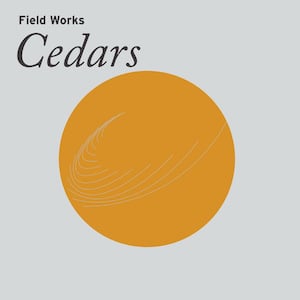
Field Works – Cedars
Temporary Residence – 5 March 2021
Poetry and music have enjoyed a centuries-long shared history, with both forms developing before the advent of the written word. Historians believe that the very first poetry was intended to be sung, and it is not a great stretch to assume that this early marriage of words and music informs what we think of today as songwriting. Even so, combining poems with music in new and interesting ways is becoming an increasingly rare occurrence. That’s where the new Field Works album comes in.
Field Works is essentially a loose collective of musicians, singers and poets headed up by producer Stuart Hyatt, and the list of genres straddled on Cedars is almost as long as its cast of contributing artists. The album is essentially split in two – the first half contains poetry in Arabic while the second half is in English – but the whole thing feels cyclical, as if natural forces were at work in its creation. There are elements of synth pop, mountain music, weird folk, cosmic Americana, Middle Eastern music and electronic ambient, amongst other things, but the joy here is how all of these things are synthesised into an engaging and often surprising whole.
Opener La’āli combines soothing strings and gentle synths. Along with the rest of the Arabic section, it is narrated by Youmna Saba, who as well as being a performer and poet in her own right is also a musicologist and expert in Arabic music. Atmosphere is everything – there is a sense of stretched time and open space that wouldn’t be out of place on a Brian Eno album or something by Hiroshi Yoshimura. But unlike Yoshimura the effect is achieved largely without recourse to field recordings; instead, it is created purely by the interaction of the human voice and the often minimal musical backdrop.
Early on, a distinctive acoustic guitar emerges as one of the album’s trademark sounds – this comes as no surprise when you learn that Lebanese guitarist Fadi Tabbal is among the list of musicians. He brings a rich and layered style to proceedings. Marisa Anderson is another important contributor. Her so-called American primitive style has always been open to non-western, and particularly African influences, so it is a perfect fit for the project. There is a smattering of pedal steel across the album too, courtesy of Bob Hoffnar (and if there is one instrument that shows off the cosmic potential of country music it’s the pedal steel), while Dena El Saffar’s oud is prominent in the Arabic songs.
These musical elements would work perfectly well on their own, but as an accompaniment to Saba’s moody, mesmerising song-poems they are extraordinary. T.S. Eliot’s frequently-quoted maxim that ‘genuine poetry can communicate before it is understood’ was originally written about Dante, but it could be extended to the Arabic-language tracks on Cedars. There is immense power in Saba’s words, even for a monoglot English listener, and music helps to refine, if not define, that power. ‘Aylūll, for example, (like much of the rest of the album) is characterised by a wildness and a oneness with nature, but there is also a certain quiet stoicism at work. Ar-raḥīl is intensely restful: undulating synths and underlying drones carrying Saba’s short, uncomplicated spoken word. Ḥalaqah ’Azaliyyah veers from speech to song and back again, a restrained epic that clocks in at little over two minutes.
The halfway point in the album marks the switch from Arabic to English vocals, and the North Carolina alt-country pioneer H.C. McEntire takes over narration, reading the work of landscape poet Todd F. Davis. At this point, for the English-speaking listener at least, the album’s themes begin to crystallise (it would be interesting to know how the dynamics of the record differ for people for whom Arabic is the first language). The Sharp Smell Of Cedar is full of brisk fingerpicking and bright pedal steel, and immediately pulls us in a direction that is more recognisably western in its musical influences. Regrowth and sensual awakening emerge as strong lyrical concerns (themes that will be revisited later in the beautiful In The Floodplain), and we find ourselves in a forest of young cedars.
In fact, the album as a whole is concerned with forests. Before We’re Born talks of an older generation of cedars, used to build boats, while In The Gloaming examines our sacred relationship with trees and our place in the natural world. These vignettes are seen through the eyes of a single protagonist, a young girl on a farm who also serves as a kind of battleground between natural processes and human intervention. Perhaps most startling of all, Drowning In A Sky Of Cotton takes the seemingly banal subject of a seasonal allergy and places it in the context of pollution and intensive farming. The psych-folk outro alone is a thing of wonder.
The closing track, The Pasture, brings about a kind of communion with nature. Its hand-drums – perhaps inspired by African percussion – hint at a kind of circularity, an echoing of the album’s first half. In fact, it immediately makes you want to listen to the whole thing over again, to forge new links between the apparently disparate halves. Cedars is a beguiling and quietly astonishing piece of work, where Stuart Hyatt’s overarching vision finds its perfect counterweight in an immensely talented and varied array of musicians.
Order via Bandcamp | Temporary Residence (Vinyl format includes MP3 Download coupon)
